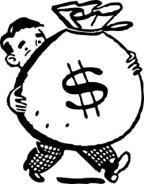
The ultra-wealthy move markets, news cycles, politics and policy with equal aplomb.
THERE’S LESS GOLD IN THEM THAR HILLS
Let me introduce you to the world’s highest earner. John Paulson started Paulson & Company, a preeminent hedge fund shop. He lucratively bet against the subprime bubble in 2006 and won big.
His latest bet was a little too big, a little too bold. He started his Gold Fund in January of 2010. It hasn’t done too well. Paulson & Co. went from $36 billion in assets down to $19 billion, due in large part to the gold drop.
Paulson’s bet is even bigger, and more unique, because he created gold-denominated shares in his funds. This way you get gold exposure even on more traditionally invested hedge funds.
“We view gold as a currency, not a commodity. It’s importance as a currency will continue to increase,” said the Queens, New York native who earned nearly $5 billion in a single year.
Here’s how well that “currency” has performed since he started. Using the SPDR Gold Trust (GLD; $111.73) as a proxy for gold, it’s been flat since Paulson’s fund was created. GLD traded at $109.80 in January of 2010 and is a couple of dollars higher, as of this writing. Also, the SPDR fund was as high as $185 during that time and is now 40 percent lower.
Take-away: beware of too much exposure to a single asset class.
THE REAL-ESTATE-TURNED-POLITICAL MOGUL
“It’s tangible, it’s solid, it’s beautiful,” so says Donald Trump about his cherished real estate. But is it really that great?
Short answer: pretty much. Longer answer: The Donald is actually invested into quite a few different asset categories. Things like aircraft, licensing businesses and alternative real estate, such as gold courses. He also has about a third of a billion dollars in cash. These other areas produce a disproportionate amount of his cash flow.
The Forbes 400 magazine just had a 15-page expose on “The Maned One,” revealing his ups and downs. Trump was on the inaugural rich list, dropped from it for several years and has been back for two decades.
Take-away: real estate can juice up returns (and risk), help protect against inflation and provide growth, income and diversification.
THE FRUGAL BILLIONAIRE
It’s hard to find much bad to say about our last “big dog”. Investment-wise he is arguably history’s most successful. Although politically he’s gotten a bit controversial, especially regarding taxation and social causes.
I’m talking about The Oracle of Omaha, Warren Buffett.
Buffett’s approach has been the most prudent of the three. His approach is an extreme in diversification. His empire spans hundreds of companies, and stocks, in dozens of countries and industries, churning out billions in new wealth and income on a regular basis. He’s gone a long way since buying a “cigar butt” textile company named Berkshire Hathaway.
Take-away: diversification really does work. For the short-haul and the long haul.